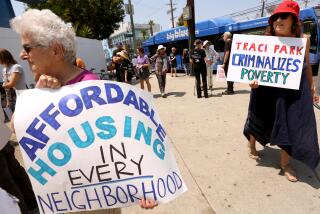In brutal attack of TV star Pauley Perrette, the famous and the forgotten collide in Hollywood

Actress Pauley Perrette arrives at the Los Angeles LGBT Center’s awards ceremony in Century City on Nov. 7, days before she was attacked by a homeless man while walking on a street in the Hollywood Hills
- Share via
He was one of the Hollywood 14. That’s a list, drawn up by concerned citizens, of the most chronically homeless and desperately ill street dwellers in the neighborhood.
“Our friend David Merck who has been sicker than ever was aggressively throwing himself into traffic today,” Amie Quigley, director of Hollywood First Presbyterian’s community outreach ministry, wrote Nov. 1 in an email to county mental health officials and others familiar with the 45-year-old homeless man.
“I hope we can get him the help he needs,” Quigley wrote, saying in the email that she had called police, who came and took Merck away.
“He is the most dangerous person I have ever seen on our streets.”
Coming from Quigley, who has been at her job six years and had known Merck as well as anyone could, that was a credible assessment.
But if Merck got any help after Quigley called police — and county officials refused to discuss his case because of privacy concerns — it was short-term and ineffective. Merck was back on the street before long, as he had been after prior arrests, and Quigley’s assessment of him proved to be disturbingly trenchant.
On Thursday, according to police, Merck attacked a woman as she walked along a street in the Hollywood Hills in what stands as an only-in-L.A. story. The woman, actress Pauley Perrette, plays a forensic scientist on “NCIS,” and she happens to be a longtime advocate for homeless people.
“He punched me right on the bridge of my nose,” Perrette told me. “I have never been punched in the face before, and that does not feel nice at all.... He kept saying, ‘My name is William,’ and he kept saying, ‘Don’t forget my name. I’m going to kill you.’”
Merck, who has a substantial criminal record as police tell it, suddenly stopped the attack and left the scene, according to Perrette, who suffered no major injuries. She drew a sketch that led to his arrest, and on Monday in court, Merck pleaded not guilty to felony charges.
Perrette told me she has for years reached out to homeless people on her own and through her church, Hollywood United Methodist. She wants to make clear that she believes it was a sick man in need of help, rather than a hateful man, who attacked her. She said in her experience, the vast majority of homeless people — including people with a mental illness — are not dangerous.
“We need full mental health care,” she Tweeted the night she was attacked. “We need housing and help for the homeless. We need to support our cops. We need to not walk alone. I need to heal. I almost died tonight.”
It seems almost a fiction that these two forces, the famous and the forgotten, would randomly collide. But in Hollywood, there’s hope — and frustration — that Perrette’s celebrity might be the thing that gets more people talking about the fact that our streets serve as outdoor hospitals and asylums.
“It should not take a celebrity getting beaten up by some homeless and violently mentally ill person to draw attention to the fact that the system is broken and desperately needs to be fixed,” said the Rev. Kathy Cooper-Ledesma of Hollywood United Methodist.
L.A. city and county elected officials, awkwardly scrambling to address a homeless emergency that somehow caught them by surprise, could take a cue from the likes of Quigley, Cooper-Ledesma and others who got tired of waiting for help and drew up their own playbook in Hollywood.
Five years ago, they began compiling a registry of a few hundred homeless people and reaching out to nonprofit housing and service providers. Kerry Morrison, who runs two Hollywood business associations and helped form the coalition, said that by 2013, Hollywood 4WRD, as the group calls itself, had found housing for roughly 150 people.
------------
FOR THE RECORD
11:34 a.m.: An earlier version of this column referred to the group Hollywood Forward. The group’s name is Hollywood 4WRD.
------------
It was a remarkable achievement and a testament to the power of a community working together on what had seemed an insurmountable problem. But there were setbacks, as well.
See the most-read stories this hour >>
“I’ve done 10 funerals in the last year,” said Quigley, who can tell stories about every person she lost to the ravages of age, disease and the elements.
A hard-core group of damaged souls is still out there, some of them aggressive or even violent, but Hollywood 4WRD hasn’t given up on them. The group meets regularly with police, fire and county mental health staffers to update their dossiers on the most vulnerable people.
A list of the Hollywood 10 was drawn up, and it grew to 14, with David Merck among the long-term projects. When he struck one of Quigley’s staffers in April, she called police, and Merck was taken in on a psychiatric commitment. But her hopes that he’d be forced into much-needed treatment were quickly dashed.
“He was released in 24 hours,” she said.
That’s because of a combination of legal barriers to forced treatment and a shortage of short-term and long-term care. There’s a shortage of political will, as well, to build what’s needed. The county is stepping up outreach to the chronically sick, but what good will it do if there’s nowhere to take them even after an involuntary commitment?
“You can be released in two hours,” said Mollie Lowery of Housing Works, which manages people with severe mental illness. In the case of someone like Merck, she said, “A psychiatrist might not know him from Adam. They see a guy who knows the name of the president and knows what day it is, and they let him go even if he has nowhere to go.”
I’m in favor of protecting the rights of people with a mental illness, but too often we’re more inclined to protect their right to suffer. The Hollywood 14 include people with alarming physical and mental maladies, repeat offenses and crippling addictions.
By moral if not legal standards, they can be a danger to themselves if not others, as the attack on Perrette reminds us.
They are the sickest of the sick and the poorest of the poor in a city of obscene riches, and they are a reminder that almost five decades after shutting mental institutions, our preferred alternatives are teeming jails and the great outdoors.
Twitter: @LATstevelopez
ALSO:
Op-Ed: How should L.A. spend its $100-million homelessness emergency fund?
In upscale Pacific Palisades, reaching out to a rising homeless population
L.A. council declares shelter crisis in effort to help the homeless
More to Read
Sign up for Essential California
The most important California stories and recommendations in your inbox every morning.
You may occasionally receive promotional content from the Los Angeles Times.











